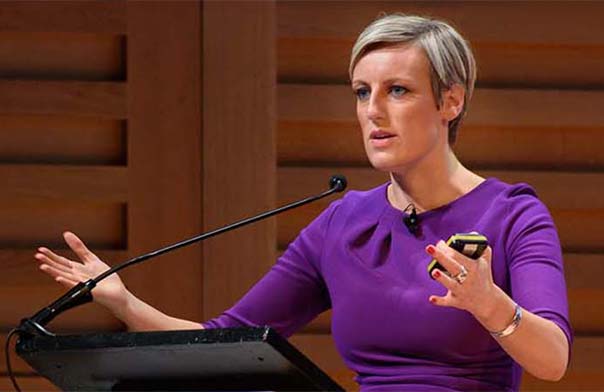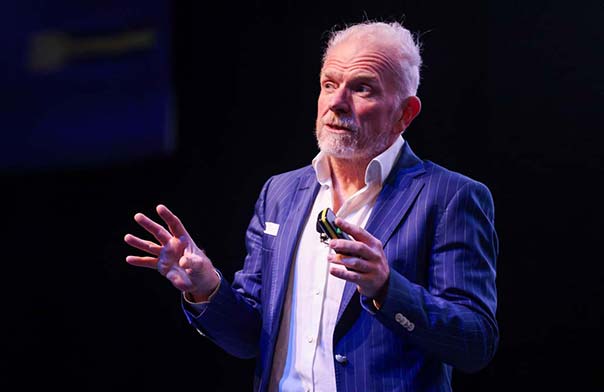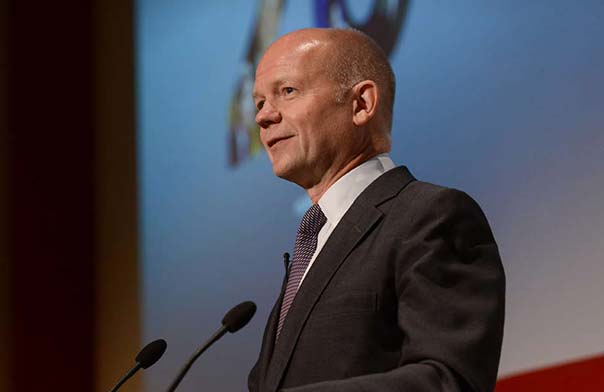You’ve been asked to present at the company conference. It’s an honour. Apparently. But all you can think about is a room of judgemental peers, staring at you, like some fevered anxiety dream. Panic sets in. You do what any sensible person does, you ask ChatGPT for five indispensable tips. You search the internet for ‘how to speak in public’. But there’s so much advice – most of it from people that have never had to present their quarterly projections or explain what their department does to 200 colleagues.
In almost 35 years as the UK’s leading speaker bureau, JLA have seen every type of speaker deliver every type of information, data and story. Alongside those speakers we book, we often also see the internal speakers – those from within the company or industry – that make up most of a conference day or event. Here are some valuable lessons we have learned from working with the best conference speakers, as well as witnessing some of the less successful.
1. Research Your Audience
Before doing anything (including, potentially, agreeing to speak) understand your audience and why you are speaking to them. Everything you say, and how you say it, is shaped by knowing who they are and what you want them to do after having heard you.
 Few speakers or presenters connect to an audience like Steph McGovern, whose remarkable ability to empathise with any audience and focus on what really matters to them sets her apart. Perfectly communicating complex ideas with a combination of humour and insight, Steph can challenge an audience or interviewee whilst always remaining approachable and respectful.
Few speakers or presenters connect to an audience like Steph McGovern, whose remarkable ability to empathise with any audience and focus on what really matters to them sets her apart. Perfectly communicating complex ideas with a combination of humour and insight, Steph can challenge an audience or interviewee whilst always remaining approachable and respectful.
As well as her knowledge and charm, Steph’s journalistic background means she can ask the right questions not just on stage, but during the briefing stage of an event. Her keen eye for the details and clues about who’s in the room and what they can benefit from hearing, means she’s able to quickly understand her audience.
Always find out as much as you (reasonably) can about who’s in the room. Beyond demographics and job titles (although that is useful), the demands on them, their interests and why they’re giving up a few hours to attend the event. Also try to identify what problem they all share and understand how you are well placed to solve it…
2. Solve a Problem
You have a great opportunity. A group of people are trapped in a room with little choice but to listen to you. Don’t squander that. Make sure they leave with something valuable – an idea, practical advice, new knowledge, a new way to approach a challenge. Reflect on what you can say that will have an impact.
 Ellis Watson instinctively understands the difficulties faced by any group – be it a department, organisation or whole industry. Not just the day-to-day issues, but the underlying questions of people, culture, leadership, strategy and motivation. Delivering uncomfortable truths with heartfelt advice based on hard-earned experience, he offers sage but practical advice in his own inimitable direct yet entertaining style.
Ellis Watson instinctively understands the difficulties faced by any group – be it a department, organisation or whole industry. Not just the day-to-day issues, but the underlying questions of people, culture, leadership, strategy and motivation. Delivering uncomfortable truths with heartfelt advice based on hard-earned experience, he offers sage but practical advice in his own inimitable direct yet entertaining style.
Once you’ve found the problem or challenge everyone shares, deliver your perspective. Be sure you are adding something to the information you’re sharing. A speech is not a chore; a mission to just read out information. It’s a chance to change something. Even what might be superficially dull, dry content can be brought to life. Your challenge is to make it relevant – to help your audience see that relevance and use it.
3. (Don’t) Open With a Joke
It’s one of the most common pieces of advice to speakers – a joke gets the audience on your side. It helps them to relax and in turn helps you to relax. It’s a confident start. Few things are as rewarding as hearing an audience laugh at something you (intentionally) said. But like most rewarding things, it’s both risky and difficult. Comedians work hard – writing, trying out material, adapting it, changing the emphasis and timing – to get a laugh. All that could be a tall order when you also have to present the new marketing plan next month.
 By all means open with a joke. If you know your audience VERY well, it could get everyone on side and, importantly, get them to focus on you and what you’re saying. One of the acknowledged masters of this is William Hague. Arguably one of the most accomplished public speakers in the country, he’s famed for his ability to deliver a well-crafted, well-timed anecdote to lead into genuine political, leadership and strategic insights. He’s frequently described as having the timing and delivery of a veteran stand up, combined with the even more unusual achievement of also having been Foreign Secretary. His store of tried and tested jokes, mixed with some self-deprecation and being one of the most recognisable faces in politics for 30 years is a near unbeatable combination.
By all means open with a joke. If you know your audience VERY well, it could get everyone on side and, importantly, get them to focus on you and what you’re saying. One of the acknowledged masters of this is William Hague. Arguably one of the most accomplished public speakers in the country, he’s famed for his ability to deliver a well-crafted, well-timed anecdote to lead into genuine political, leadership and strategic insights. He’s frequently described as having the timing and delivery of a veteran stand up, combined with the even more unusual achievement of also having been Foreign Secretary. His store of tried and tested jokes, mixed with some self-deprecation and being one of the most recognisable faces in politics for 30 years is a near unbeatable combination.
What if you’re not a senior politician and statesman, blessed with a dry wit and a life of meeting the global great and good? What if that joke falls flat? If people don’t get the reference or you get the lines muddled? Do you really want that stress? Do you want to risk everything on an opening line?
If there’s a chance you might offend someone. If you don’t know almost everyone in the room. If you doubt your joke-writing or delivering skills even slightly – open with a story instead. Something people can relate to and remember. It can be a light-hearted story, but by focusing on the narrative it takes the pressure off getting a laugh whilst being an engaging way into a presentation.
4. Tell a Story
What is the story you want to tell? Is it how well the company or team has done? Is it about tackling a problem, motivating the team, or preparing for the future? If you’re sharing information, what’s behind it – a story of success or of struggle – and how should the audience use that knowledge? Try to find a story that can illustrate that.
There’s extensive research on the power of stories, their structure, the psychology and their anthropological origins as a method of remembering important information. What matters here is that they are memorable and if the audience remembers your story, they’ll remember why you told it.
 Tim Harford has become an expert in finding and recounting the stories that perfectly illustrate how the world works, the human potential for creativity, and the unintended consequences of technology. From tales of aircraft autopilots to jazz musicians to coffee shop pricing structures, he perfectly demonstrates how a specific moment in time illustrates a bigger reality and the truth of human behaviour. Tim’s stories stay with audiences and change how they think about what they do and how they do it. Audiences leave with new perspectives and ideas, in large part because they remember the underlying lesson of a story.
Tim Harford has become an expert in finding and recounting the stories that perfectly illustrate how the world works, the human potential for creativity, and the unintended consequences of technology. From tales of aircraft autopilots to jazz musicians to coffee shop pricing structures, he perfectly demonstrates how a specific moment in time illustrates a bigger reality and the truth of human behaviour. Tim’s stories stay with audiences and change how they think about what they do and how they do it. Audiences leave with new perspectives and ideas, in large part because they remember the underlying lesson of a story.
Spend time trying to find a story that fits your presentation. Something that looks at how a problem was solved or a lesson learned; how a new perspective came into focus, or how a crisis became an opportunity. It could be personal or professional, fact or fiction, something in the news this week or from ancient history.
5. To PowerPoint or Not to PowerPoint
Another frequent question is whether to use slides. PowerPoint has almost become a by-word for uninspiring lectures featuring pages of bullet-pointed text, low resolution images and gimmicky slide transitions. Poor slides can completely undermine what you have to say. Eyes are always drawn toward images so you’re words could be fighting a losing battle for attention from the outset.
Sometimes you have no choice. You have to show a graph or emphasise a point. But ask: does your slide support your story or distract from it? How could I present this in a different way?
Not many speakers use slides with the impact that Brian Cox does. His spectacular images of planets, nebulae and stars bring alive his tales of discovery and progress. Whilst we can’t all expect to use stunning pictures from multi-million dollar astronomical projects, Brian’s content would be as compelling and inspiring without them. They serve his narrative rather than distract from it. They illustrate or enhance what he says about human achievement, the wonder of life and our search for knowledge.

Be honest. Do your slides add value? If they’re not making a complicated point more digestible or memorable, consider ditching them. That particularly applies to text in slides. Never use slides as a prompt or safety net. Never read out slides. Not only does it make for a poor presentation, it increases the chances of you struggling should the tech fail.
A short, spoken presentation may simply not be the place to absorb detailed information. If you have data and figures your audience will benefit from contemplating, send them a supporting document afterwards. Then they can go through the minutiae in their own time, and focus on what’s important to them.
6. And Finally…the Motivational Bit
Don’t over-analyse the advice you’ll hear about moving around a stage, varying your voice, and making gestures. If you’re only called on to speak occasionally, taking a few tips from seasoned professionals can help make the dubious honour of addressing the company into a more rewarding experience – for you and your audience.
Focus on delivering a clear, useful message. Practice delivering the speech. Try to slow down and breathe steadily. Pick out some friendly faces in the audience and speak to them. Check your tech beforehand, but then leave it alone. And be yourself.
The best speakers don’t play a role. They don’t force themselves to deliver a joke or use slides if they’re not comfortable with it or it doesn’t add anything. If you’re giving a presentation, it’s likely someone has asked you to. Remember, they’ve asked you for a reason. You are the best person for the job. Deliver something particular to you. Listen to advice, but find and trust your own voice.